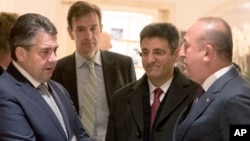Germany's foreign minister thanked his Turkish counterpart Monday for granting consular access to a German-Turkish journalist detained since January, the first positive development between the two NATO partners after weeks of acrimony.
The detention of Deniz Yucel on charges of producing terrorist propaganda and incitement to hatred was one of several issues that have caused friction between Ankara and Berlin in recent months.
Foreign Minister Sigmar Gabriel said that he had pressed Germany's case for diplomatic access to Yucel in one-on-one talks with his Turkish counterpart Mevlut Cavusoglu on the sidelines of a NATO meeting on Friday, and that Cavusoglu came through, telling him verbally on the weekend it would be granted.
“This morning Turkey also officially confirmed that we will receive access to Deniz Yucel tomorrow finally so that we can determine for ourselves his wellbeing after difficult days in custody,” Gabriel said in a statement.
Turkish President Recep Tayyip Erdogan has alleged the reporter for Die Welt was a German spy and a “representative” of the Kurdish PKK rebel group - all of which the newspaper denies.
Germany has pressed repeatedly for consular access to Yucel, something Turkey was not obliged to provide because the reporter is also a Turkish citizen.
In comments last week, Gabriel slammed Turkey for preventing access, saying “one must almost assume that Yucel is serving the Turkish leadership as a political football in a dirty election campaign.”
Yucel's case is just one of several spats to arise between Ankara and Berlin over the past year - at a time when Germany and the rest of the European Union are looking to Turkey for its support in the fight against the Islamic State and in helping slow and regulate the flow of migrants into Europe.
Turkish officials' attempts to rally support among their citizens living in Germany last month for a referendum over whether to expand Erdogan's power caused widespread irritation in Germany, and several of their public events were canceled. That caused Erdogan to accuse German officials of acting like Nazis which, in turn, prompted strong condemnation of the Turkish president's words from Chancellor Angela Merkel.
There are some 3 million people of Turkish origin in Germany, almost half of whom were eligible to vote in the referendum.
There was further sniping between the two governments last week, after German officials revealed that Turkey's foreign intelligence agency MIT had provided them a list of suspected supporters of a U.S.-based cleric, who Turkey claims was behind last year's failed coup.
Turkey asked Germany to put the people under surveillance, but instead Germany warned those on the list, which reportedly included a member of German Parliament, they were under Turkish suspicion.
Turkish Prime Minister Binali Yildirim called the German move “not ethical.”
A German parliament resolution labeling the early-20th century killing of Armenians in Turkey as “genocide” and an offensive poem about Erdogan by a German comic have also soured relations between the two countries.




